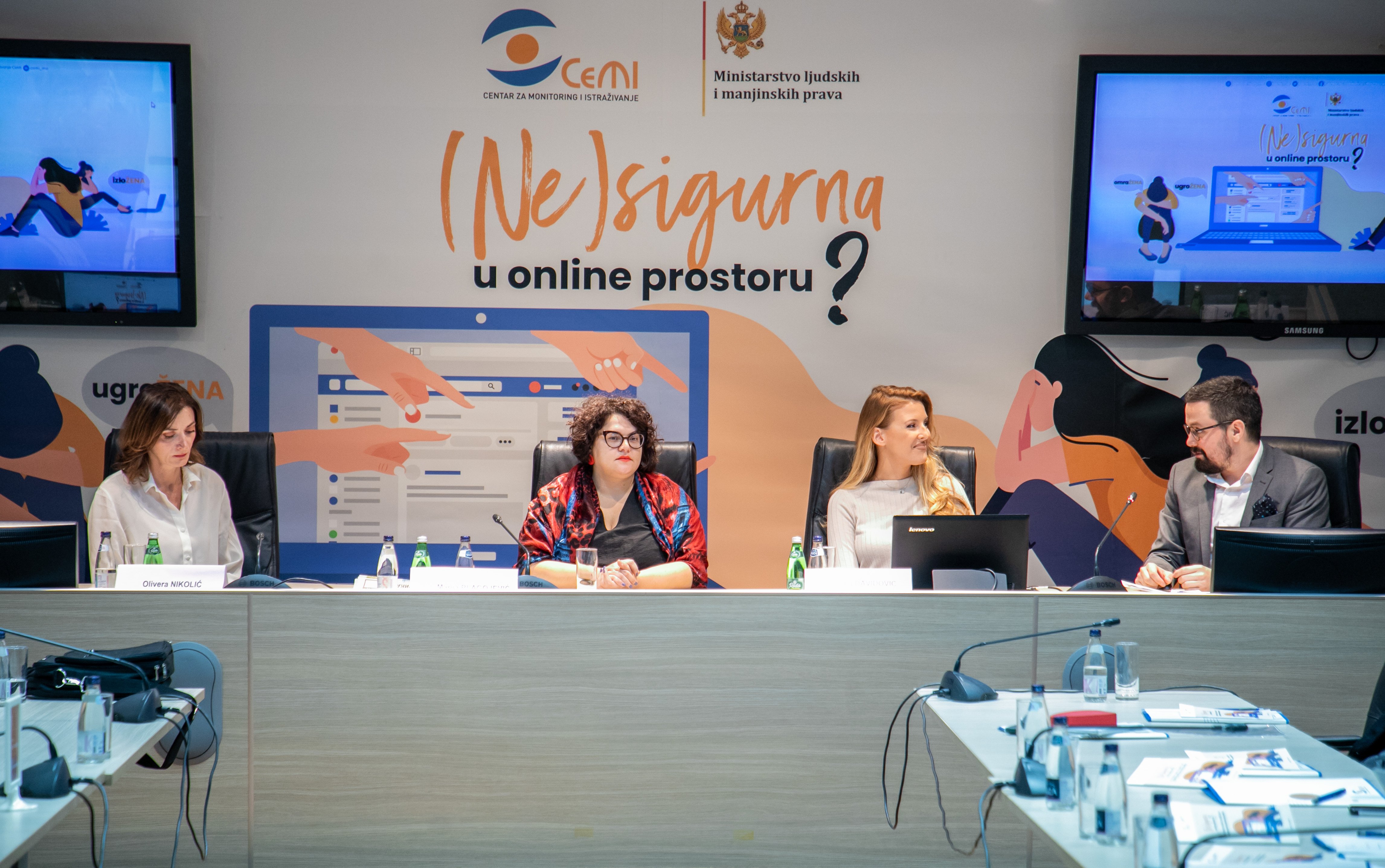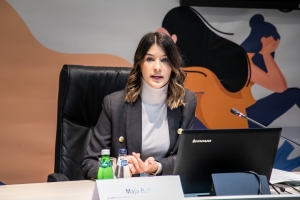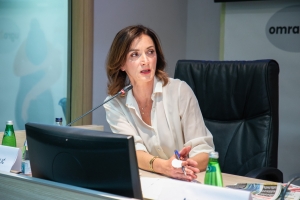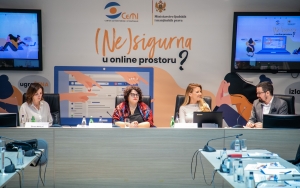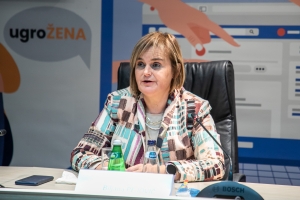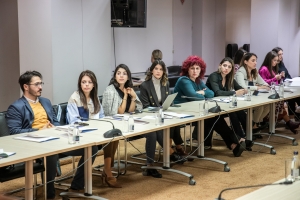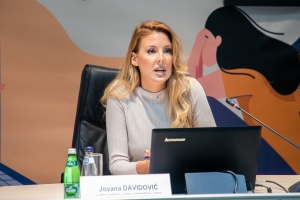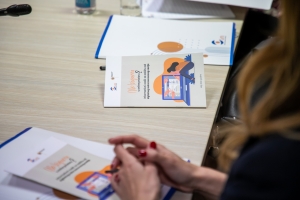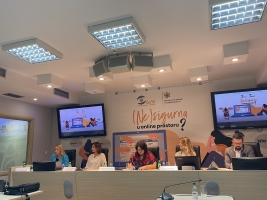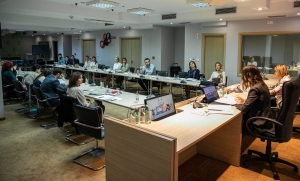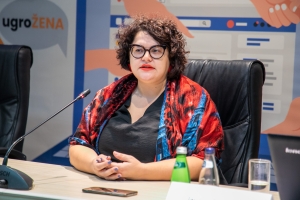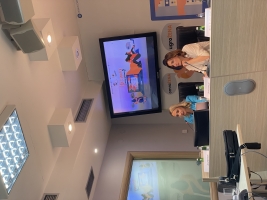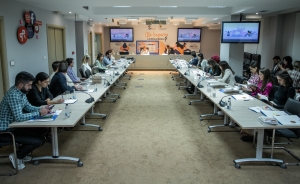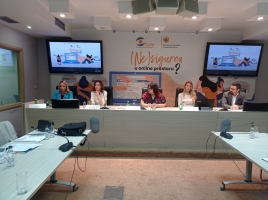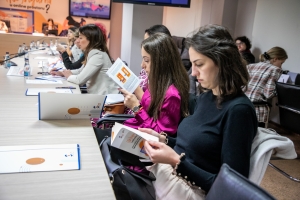Montenegro needs a systemic response in order to combat the growing online violence against women engaged in public work and to strengthen institutional protection so that they are empowered to react if they become victims.
This was announced at the conference "(Un)safe in the online space", which was organized by the Center for Monitoring and Research (CeMI) within the project "Step towards gender equality: Fight against digital gender-based hate speech and violence".
The project coordinator at CeMI, Maja Bjelic, said that we are witnessing more and more frequent occurrences of systemic internet violence against dissenters in Montenegro, which, as she stated, is often coordinated by different political centers.
"Prominent individuals in society, creators of public opinion, leaders of NGOs become targets of brutal campaigns of untruths and insults." The goal is to intimidate those who are the target, but also to threaten everyone else who expresses their opinion. One of the groups most exposed to this type of violence are women in public life and politics in Montenegro. "Unfortunately, society does not have an adequate response to suppressing this problem, and there is no adequate reaction from the institutions," Bjelić pointed out.
She pointed out that in the project CeMI analyzed the occurrence of misogyny, the spread of gender-based misinformation and online attacks on women whose jobs are public.
"Hate speech always spreads towards women who are ready to publicly express their views on certain political issues, and because of that they are "punished" because they are engaged in "men's work", stated Bjelic.
She said that CeMI carried out monitoring of thematic content from March to September, observing the activities of 81 Facebook pages, of which 28 media pages, 12 state bodies, 18 meme pages, five politicians, 17 political parties and one organization.
"When it comes to monitoring content on online portals, almost nine times more negative content was identified in the reporting period than positive content that dealt with women in different ways," warned Bjelic.
She assessed that more attention should be paid to this problem in society, and that a systemic response is needed.
"We need a united reaction and cooperation of the state, the media, social networks, regulatory bodies and non-governmental organizations in order to stop the growing internet violence against dissenting women," said Bjelic.
The head of the Department for Gender Equality in the Ministry of Human and Minority Rights of Montenegro, Biljana Pejović, said that we are witnessing hate speech against women, which has taken on a wide scale.
"When we talk about hate speech and online violence, these are the most common ways of discrediting dissenters in modern society. With the popularization of social media and various platforms of modern communication, access to public space has become very attractive and easy for hate speech. We are witnessing that misogynistic speech and hate speech are on the rise in our country," said Pejović.
She pointed out that one form of hate speech against women is negative comments on expressed attitudes.
"The Internet allows for anonymity which is extremely dangerous." Women are more often the victims and these attacks affect the dignity of women in the workplace, prevent her from expressing her opinion and often threaten her right to freedom of speech," said Pejović.
The Project Coordinator in the Program for Gender Equality in the United Nations Development Program (UNDP), Marija Blagojević, assessed that laws and institutional mechanisms are extremely important and one of the main links in the fight against discrimination against women, but they cannot change entrenched patriarchal patterns. "according to which we are structured to live and behave".
"Today, you only have about ten percent of property owned by women. This is a direct consequence of the patterns and behavior we are used to." Today, the family law in Montenegro guarantees equality between heirs and heiresses, but women predominantly renounce their share of the inheritance due to the deeply rooted manifestations of customary law that remain," said Blagojević.
She pointed out that today women are more educated in Montenegrin society, but that this is not reflected in the labor market, where 60 percent of the total number of unemployed are women.
"In the last two or three years, as the number of women in decision-making positions has increased, violence against women in public space is more visible," said Blagojević.
She reminded that UNDP conducted a survey on violence against women in politics in Montenegro last year, which showed that nine out of ten women in politics confirmed that they had experienced some kind of discrimination.
"Seven out of ten women confirmed that they have experienced some kind of violence, whether it is online violence, media, psychological violence within the party, financial, physical. This showed that the problem is very present in Montenegro, and it is much more visible lately," said Blagojević.
The executive director of the Media Institute of Montenegro, Olivera Nikolić, said that the dominant image of women in a society largely depends on their representation in the media.
"When we look at the narratives in the media, we notice that they are still such that all gender stereotypes are encouraged, where it is rare that we have a situation where women and men are equal in terms of their personal qualities and professional abilities, and that the woman is not put in the context that she is it is important that she is a mother, wife, etc.," said Nikolić.
He believes that stereotypes are still rooted, that they can block social change, and that the media is very much responsible for that.
"The role of the media in society is emancipatory, but now there is re-clericalization, re-traditionalization, re-patriarchalization of societies, and things are getting harder." These trends are also felt in Europe. At the same time, social reaction and condemnation are absent, as well as solidarity between women," believes Nikolić.
According to her, the online violence against women that is present is only the tip of the iceberg, stating that the essential problem is violence and aggression that have increased, "which we have in society and which we do not deal with enough".
Nikolić assessed that online comments on portals and social networks need greater self-regulation, social responsibility of the media and a more proactive approach.
Teaching assistant and doctoral student in the field at the Faculty of Political Sciences of the University of Montenegro, Jovana Davidović, presented the research that was part of her doctoral dissertation, which in one part deals with media reporting in Montenegro on the topic of selective abortion.
The research was conducted from 2012 to 2019, and all types of media were analyzed.
"The research showed that more than 50 percent of the media information was signed in some way, but the fact that more than 40 percent of the information was not signed or was taken from other authors is worrying," stated Davidović.
She said that the photos in the media were most often personalized, that they showed people who were quoted, but that the content of the depersonalized photos was interesting.
"Depersonalized photographs most often showed pregnant women who are undergoing a medical examination or are alone in the photo, with their pregnant belly exposed. "Depicting depersonalized pregnant women further dehumanizes women as such, portrays them as a medical tool, and reduces a partnership act such as pregnancy to only the woman and her responsibility," said Davidović.
As she pointed out, the research showed that 76 percent of the news was motivated by the actions of external actors, and that less than one third of the media sample was inspired by the initiative of journalists.
"77 percent of the posts belong to the factual genre, the rest are of the analytical type. "Negative statements were most often present in the comments, followed by positive and negative statements and, in the smallest part, positive statements," said Davidović.
She indicated that only a fifth of the information was indirectly related to the issue of selective abortion.
"For seven years and 245 announcements, a fifth of them were indirectly related to selective abortion," specified Davidović.
As she said, the survey showed that every second citizen of Montenegro believes that a woman is incomplete as a person if she is not a mother.
"In the survey, only 11 percent of citizens openly support selective abortion." When you ask them whether selective abortion should be allowed in families where there are no male children, that percentage doubles. "Every fifth respondent openly supports abortion in families where there are no male children," said Davidović.
She pointed out that the discourse analysis showed that the topic of selective abortion was marginalized in every fifth media publication.
"The private patriarchy that we have in the outside world is transferred to the media space and its presence is reflected in the naturalization of women's identity, and the reduction of her role to a reproductive function," said Davidović.
An external expert at CeMI, Ana Nenezić, spoke about the political campaign related to local elections in Podgorica and 13 municipalities and examples that illustrate violent behavior in the online space, which, she believes, causes no less consequences than other forms of violence.
"It is enough to look at the numerous mimes that have been created in relation to the image of a female politician in today's society, so unlike the criticisms we can hear of male politicians, regarding their actions, we see criticism of women through various caricatures and bad messages that concern the integrity of a woman, her physical appearance, family circumstances," said Nenezić
He believes that a good solution that will contribute to the suppression of this violence is the new law adopted by the European Commission on digital services, which will enter into force at the beginning of next year.
Teaching associate at the Faculty of Political Sciences of the University of Montenegro and moderator of the G-spot podcast, Marko Savić, pointed out the consequences and connection of gender-based violence in cyberspace with the protection of human rights.
"The reality of this type of violence against women and girls is also indicated by the serious consequences that such violence causes: emotional stress, loss of status, inability to advance professionally, loss of self-confidence and self-esteem, reduction of productivity, withdrawal from public life, invasion of privacy, and even suicide." Therefore, we are talking about consequences for mental and physical health and endangering life," said Savić.
He believes that it is important to raise awareness of the aspect of the so-called digital durability.
"This kind of violence permanently marks a woman's identity in cyberspace, knowing that in the endless sea of content on the Internet, each segment remains stored somewhere and is almost impossible to permanently remove. This is an aspect that points to long-term consequences for a woman who has experienced this form of violence," Savić pointed out.
The conference was held as part of the project "A step towards gender equality: The fight against digital gender-based hate speech and violence", implemented by CeMI, and financed by the Ministry of Human and Minority Rights of Montenegro.
